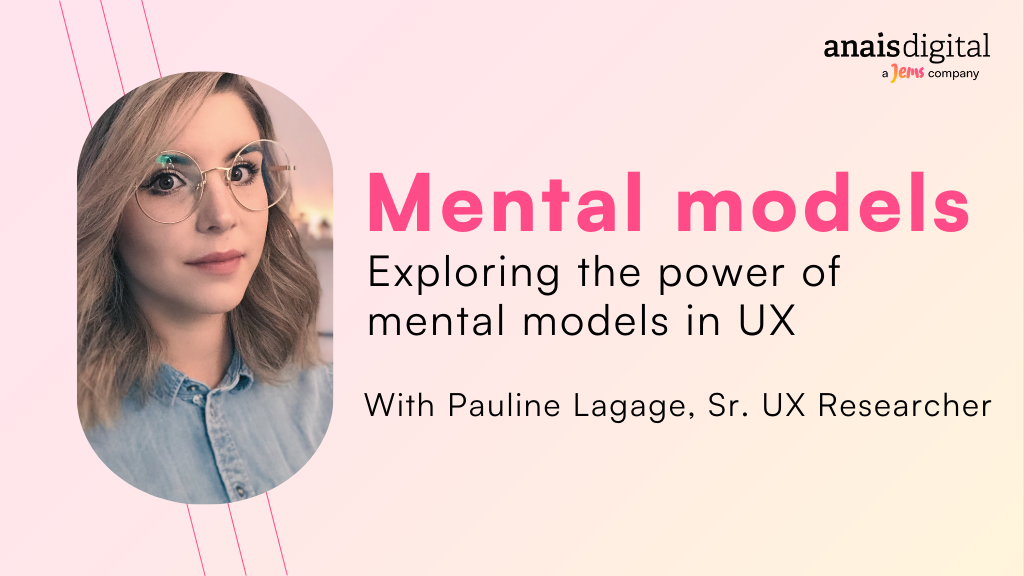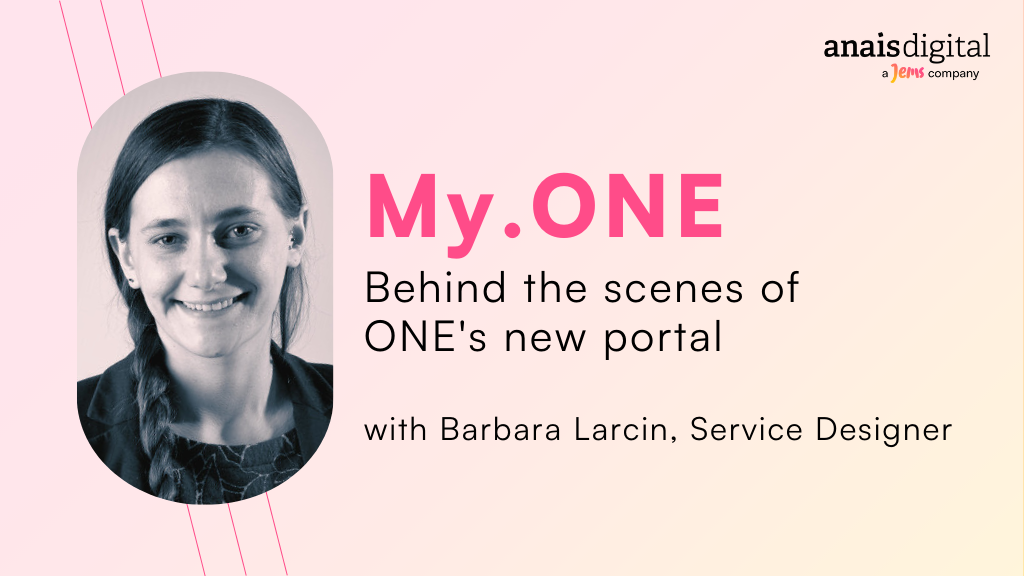
Do you sometimes feel that UX design skills are out of reach? Don’t worry because although not everyone can call themselves a “UX designer”, with the right tools and methodologies, anyone can become one.
Listen to our podcast episode with Alexandre Dehon, Lead UX Researcher and UX Trainer
In this episode, Alexandre Dehon, a trained sociologist and ergonomist, discusses:
- The importance of being trained in UX in order to develop methodologies that will help improve existing user experiences or create new ones.
- The diversity of the UX universe which is not limited to design and includes diverse fields such as sociology, accessibility, ergonomics, physiology, etc.
- The advantages of the ULB UX academic certification (in partnership with Anais Digital), a program based 30% on theory and 70% on practice and given by real experts and consultants in UX Design.
Do you want to improve your UX skills? Discover the UX services and UX training offered by Anais Digital.
If you like to solve problems and are motivated by this field, read on!
The field of UX (short for “User Experience”) is becoming more and more popular, but like many trending terms, it is increasingly overused.
On Linkedin, many people use the term “UX Designer” on their profiles, but in reality, few of them have actually followed a UX training.
This is one of the main findings of Alexandre Dehon, Lead UX Researcher at Anais Digital and trainer at the Université Libre de Bruxelles (ULB).
For the past 4 years, this academic training given by ULB in partnership with Anais Digital (unique in Belgium) has offered a program covering all the key skills that a UX designer must have.
Over a period of 4 months, it combines theory and practice, taught by UX design professionals.
At the end of the training, students obtain an academic certificate.
Why is it important to get a real certification in UX Design?
UX Design is a very specialized field that combines skills, such as:
- data analysis
- prototyping
- intuitive interface design
By taking a UX training course, you will learn how to design products that meet the needs and desires of the user.
It will also give you an understanding of the processes involved in creating a product or application that is accessible, ergonomic, and intuitive.
A UX design course will give you the tools and expertise to conduct in-depth research to understand user behavior.
The results of these surveys can then be used to improve the user experience.
It’s also important to note that UX design is a constantly evolving discipline. Training can help you stay up to date on best practices and the latest technologies.
What skills do I need to take a UX design training course?
To embark on a UX design certification, it is essential to have a solid foundation in statistics.
It is necessary to be able to analyze, collect and transform data into something actionable.
Moreover, you must be interested in digital, psychology or sociology. If you are curious about new design trends, this is a real plus.
The training will allow you to develop skills in project management and meeting facilitation. If you are sociable and not afraid to reach out to others, you will definitely have an advantage.
Finally, don’t panic if you don’t check all these boxes: if you are willing to put in the work, there is no limit to what you can accomplish!
Transcript of the episode
No time or opportunity to listen to this podcast? Here is a transcript.
[00:00:04.230] – Alexandre Dehon
My name is Alexandre. I have a background in human and social sciences with a specialization in ergonomics. At the beginning, I was an ergonomist. I was interested in the relationship between human beings, machines, production lines and work environments. I realized that in fact, the relationship between human beings and digital tools interested me strongly.
The word “UX” was coined about ten years ago by Don Norman, who came from Apple. This word has come to mean everything and anything. Today, there are many people who put on their LinkedIn profile: I’m a UX designer, UI/UX Designer, UX and many other things, but in the end, they haven’t received the training to practice this profession with all the depth it implies.
So, it’s important to get trained in UX to acquire real methodologies that will really allow you to understand this experience, to be able to improve it or to create new ones.
[00:01:15.530] – Alexandre Dehon
We do UX from the moment we are able to meet the user and so a UX training, in the end, is a training that will allow you to meet the users, to collect what they need and then you can offer them what you think they need.
The training is built like a real UX project. It follows the framework of user-centered design from the project management phase, the discovery phase, the ideation phase, the creation phase and the testing phase. We built the training on this framework so that it would be more logical and easier for the participants to immerse themselves. It is really oriented on practice. We have a ratio of about 30% on theory and the rest on practice.
So, it is formalized in the form of days, on Tuesdays from January until April and there are two courses that are given.
[00:02:22.640] – Alexandre Dehon
In these two courses, we have a phase where the learner will receive the theoretical background, best practices, some tools and will then be able to apply what was heard and given to a project. Either the project is linked to exercises that are done in class, or the project can be a personal project or a business project where the student will be able to apply what he has learned.
The training is led by people who are all in the industry as consultants or university professors. Another important point in the creation of this training, which is unique in Belgium, was to have something with an academic basis so that the participants receive a background based on scientific information. We use psychology, sociology, everything that is going to be the science of information or sometimes even physiology, courses on accessibility, courses also on empathy, so we are also going to be interested in the physical aspects of the human being faced with the interfaces.
[00:03:33.200] – Alexandre Dehon
All the speakers have this strong background in UX or ergonomics and this is what really differentiates the training in Brussels from other training courses that could exist on the market in Belgium, or even on the market in France, since we have many students who come from France to follow this training. We are not going to teach the students how to use Figma or to do guided design or to get too involved in graphic tools.
But we will teach them the methodologies for collecting user feedback, understanding needs, creation, ideation, collaboration, so everything that is really linked to the user experience before the interface.
The training is aimed at two main groups of participants, either people who really want to make UX their job and so it’s really interesting for them because they will acquire all the methods to become a UX practitioner. We provide them with enough background to become a UX practitioner, whether it’s people who want to do UX research or UX design, or even UX copywriting, there are quite a few students who have gone down this path. That’s the first big group of participants.
[00:04:58.260] – Alexandre Dehon
The second group is made up of people who are either project managers, entrepreneurs, or even marketers who want to better understand UX in order to apply it to their job. There are also front-end developers or product owners.
And there, they will benefit from the training as an additional skill.
As far as the prerequisites to follow the training are concerned, there is no exact path. However, it is clear that the person must have certain statistical skills.
In digital, one must have a very good understanding of digital. Obviously, you have to be interested in psychology, sociology, design trends and new technologies.
You have to be able to analyze data, even collect data and transform this data into something actionable. There is also a whole part that is linked to project management and even to facilitation.
[00:06:07.160] – Alexandre Dehon
These are elements of skills that are important to have.
If you are interested in the training and maybe you still have doubts, the first thing to do is to contact us and then, if you feel like making the jump, the registrations are done on the ULB’s continuing education website.
* * *
Do you want to improve your UX skills? Discover the UX services and UX training offered by Anais Digital.









